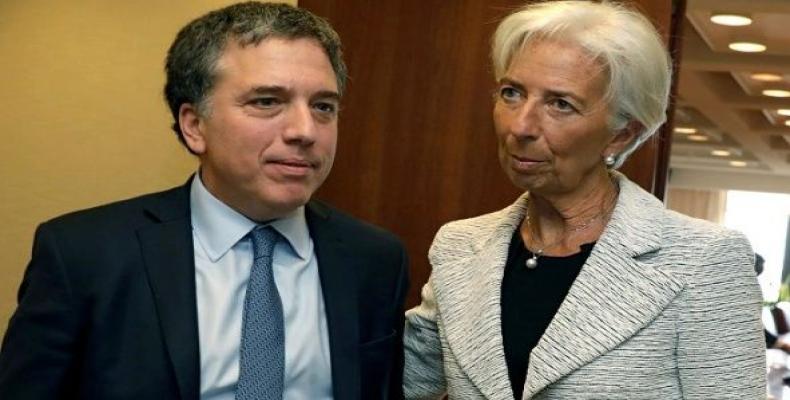Buenos Aires, May 23 (RHC)-- Nicolas Dujovne, Argentinean Treasury Minister, has been appointed “super minister” by Mauricio Macri's government, which means he will direct the country's economic policy and oversee the finance, interior, employment, energy, transportation, agriculture, production, modernization and tourism ministries with veto power.
Dujovne, who used to be the a TV show host on the Grupo Clarin news outlet, traveled to Washington on Tuesday to lead the controversial negotiations with the International Monetary Fund for a $30 billion loan. The negotiations with the IMF were sparked by a bank run that destroyed about a fifth of the value of the Argentinean peso in recent weeks. Observers say that Macri is trying to control the crisis, but his decision to go to the IMF has proven extremely unpopular.
So far, the ones leading Argentina's economic policies were Mario Quintana and Gustavo Lopetegui, the cabinet's vice chiefs, through the Treasury and Finance Ministries, but the appointment of Dujovne is restructuring the way decisions are taken in Macri's government. Dujovne's economic plan includes a series of measures that might spark further protests among the most affected population. Among his proposals are to unpeg the dollar, lower the central bank's interest rates (currently at 40 percent), reduce the fiscal deficit and lowering inflation.
But Macri's growing unpopularity, evidenced by widespread protests by unions, students, human rights advocates, and other social sectors who protested against the social cost of economic decisions, will prove to be a tough challenge for Dujovne. He will reportedly have to face several challenges to help the Argentinean economy recover, and avoid another bank collapse. But critics say it's difficult to trust national banks when Dujovne, now in charge of the country's economics, has his own money in foreign banks and owns an offshore company.
Many Argentineans are weary of Macri’s decision to go to the IMF. Their concern is related to the 2001-2002 economic crisis that many believe was a direct consequence of applying IMF-sanctioned structural adjustment policies, including free-trade, financial markets liberalization, and social spending cuts.
The 2001-2002 crisis left millions in poverty. Over the years, the progressive government of Nestor Kirchner paid the country’s debt with the IMF in full and cut all ties with the financial institution.
Argentinean president appoints 'super minister' with offshore assets ahead of IMF deal

Articles en relation
Commentaires
Laissez un commentaire
Tous les champs sont requisPlus de visites
- Les États-Unis annoncent des restrictions en matière de visas liées à la coopération médicale internationale de Cuba
- Le chanteur populaire Paulo F.G. meurt dans un accident de voiture à La Havane
- Cuba : les migrants à Guantanamo sont une provocation et un affront à la souveraineté (+Photos)
- Le gouvernement cubain condamne les intentions des États-Unis concernant la base navale de Guantanamo
- La fermeture de l'USAID ne signifie pas la fin des agressions contre Cuba

